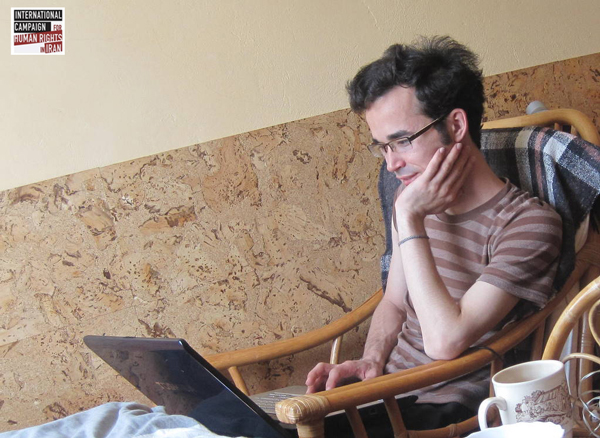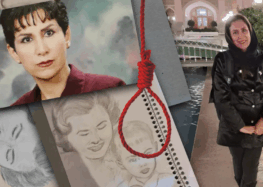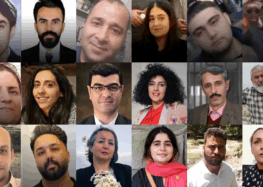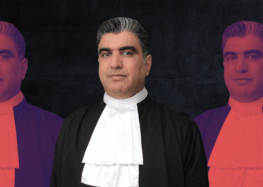Omid Kokabee, in Letter from Prison, Accepts Prestigious Science Award

An acceptance speech by Omid Kokabee, written from his prison cell in Iran, was delivered at the Award Ceremony for the American Association for the Advancement of Science (AAAS) 2014 Freedom and Responsibly Award on February 13.
The gifted Iranian doctoral student of physics, who is being held as a prisoner of conscience at Evin Prison in Iran, is the first doctoral student to win the prestigious award. He was honored by AAAS “for his courageous stand and willingness to endure imprisonment rather than violate his moral stance that his scientific expertise not be used for destructive purposes and for his efforts to provide hope and education to fellow prisoners.”
The 32 year old scientist has been incarcerated in Evin Prison in Iran since January 2011, on falsified charges of espionage, for his refusal to work on military research projects in Iran.
In Kokabee’s speech, which was delivered by Professor Herb Berk of University at Texas Austin (where Kokabee had been studying before his arrest) at the award ceremony during AAAS Annual Meeting in San Jose, California on February 13, 2015, the imprisoned physicist wrote, “It is a great and precious honor” to receive the award.
Kokabee noted that it has been “a painful shock to be incarcerated for a long period, without any legal justification, against my home country’s national interests and in violation of international human rights’ principles,” and declared that he would take this opportunity to declare his “absolute innocence.”
In his speech he wrote, “I was only a scientific researcher. I was not involved in any political activities or held any political views. But they threatened to send me to prison for 10 years if I refused to cooperate in nuclear projects with certain organizations against my will,” and noted that “It is because of our moral and academic principles that we suffer the hardships of prison, rather than being part of an effort that makes the world suffer.”
In an eloquent defense of the moral obligations of scientists he wrote, “Scientists are responsible for their work and its impact on society and the future of humanity, just as a mother protects her child and feels responsible in raising her properly. Scientists have a responsibility to refuse cooperation in any project which is harmful to society.”
Kokabee also called for scientific and human rights groups to cooperate and expand their activities, and for the establishment of “a joint international organization that would create the largest network of scientists from around the world to train courageous, responsible and humanitarian scientists armed with moral principles. This group would make the public aware of the dangers of misusing scientific and technological advances. In addition, this organization would rise to the defense of scientists who face danger because they are upholding their humanitarian principles.”
Omid Kokabee was a post-doctoral physics student at the University of Texas at Austin at the time of his arrest on January 30, 2011, at Tehran’s International Airport, when he was leaving Iran after visiting family. He was kept in solitary confinement for over a month during his 15-month pre-trial detention without access to a lawyer. On May 14, 2012, he was sentenced to ten years in prison for “contact with enemy states” and other falsified charges. In an open letter from Evin Prison, Kokabee wrote in 2013 that his arrest followed his refusal to cooperate with security agents on a military research project. Despite an Iranian Supreme Court’s decision rejecting the legality of Kokabee’s conviction, an appeals court upheld his ten-year sentence. Kokabee suffers from heart palpitations, asthma, and kidney disease, but has been denied medical care outside the prison despite his repeated requests.
Kokabee was awarded the 2013 Andrei Sakharov Prize by the American Physical Society for “his courage in refusing to use his physics knowledge to work on projects that he deemed harmful to humanity, in the face of extreme physical and psychological pressure.” In an open letter published in the scientific publication Nature to Iran’s Supreme Leader Ali Khamenei on September 26, 2014, eighteen Nobel Peace laureates asked for the “immediate and unconditional” release of Kokabee. Since the letter was sent, thirty-one Noble Laureates have endorsed the letter. In December 2014, 161 doctoral students and graduates from universities around the world released an open letter demanding medical attention for Kokabee and calling for his release.
In announcing the award, the AAAS’s award selection panel noted, “It is uncommon that scientists risk their freedom in defense of the principle of scientific freedom for all scientists, and yet this 32-year old physicist, at the beginning of a promising career, has done just that.”






